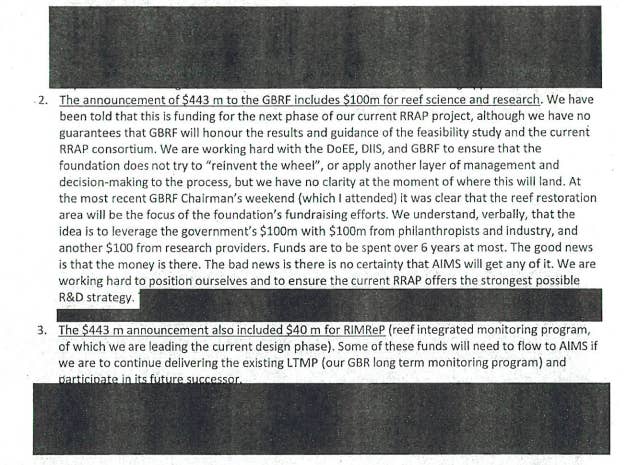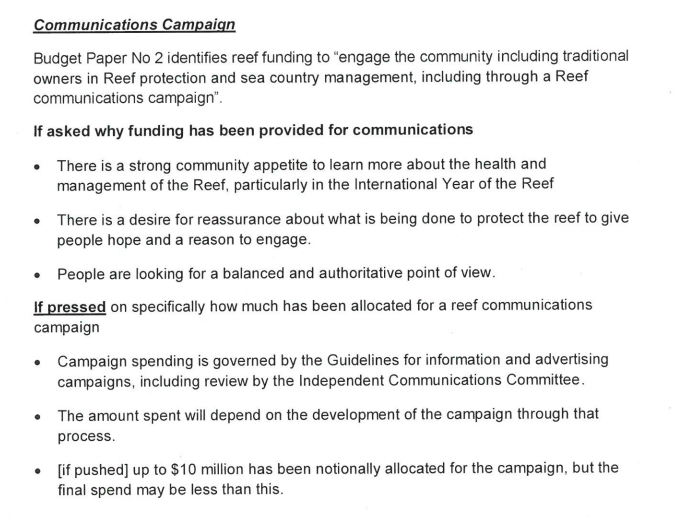
Emails released to the Senate recently reveal the Australian Institute of Marine Sciences (AIMS) saw some “bad news” in funding for Great Barrier Reef restoration projects being allocated to the Great Barrier Reef Foundation (GBRF), rather than being provided directly from the government.
The Budget in May included $443 million for the Great Barrier Reef, all of which was controversially given to the private GBRF to work on five projects to ensure the future of the reef.
One of the components of the grant is $100 million for reef restoration and adaptation, but in January, the government had tasked AIMS and the CSIRO to conduct a scoping study for how best to restore the reef. It is due to report back in June next year.
Then in April, after one meeting with then prime minister Malcolm Turnbull and then environment minister Josh Frydenberg, the GBRF got the funding AIMS was aiming for.
The announcement took the government organisations AIMS and CSIRO by surprise. Instead of going through the usual process of getting a grant from the government following the study, the organisations would now need to go through the GBRF.
In AIMS council meeting minutes from June released to the Senate with hundreds of other documents and emails about the project this week, AIMS said it had been offered “no guarantees” that the GBRF will honour the results of the AIMS/CSIRO feasibility study.
The minutes also showed AIMS had been told that GBRF would attempt to increase the $100 million provided to reef restoration with $100 million from philanthropists and industry, and $100 million from research providers.
“The good news is that the money is there,” CEO Paul Hardisty said in the report. “The bad news is there is no certainty that AIMS will get any of it.”

“AIMS will need to work hard to secure funding arising from [the] current feasibility study and to maintain positive relationships with GBRF and others,” the meeting minutes state.
“The CEO stressed the importance of securing funding to enable a cohesive program geared towards positive outcomes over the longer term.”
Labor has called on the GBRF to return the grant to the government, and AIMS was concerned that politics might mean longer-term projects risk being axed.
The minutes record that Hardisty said that he remains optimistic that any postelection government would “continue to invest” in the area.
AIMS executive director of strategy and development David Mead told the meeting that the bigger risk was “short term, high profile activities” might be prioritised.
“[Mead] advised that there is a disconnect between government’s understanding of what will be delivered from the $100 million investment and what can actually be achieved in the short term,” the minutes state. “[Hardisty] noted that four fifths of the funding has been allocated to conventional management techniques, and this is an indication that government does not yet fully understand the time or investment required for large scale restoration projects.”
In another email, AIMS COO John Chappell shared an article with the AIMS executive team outlining that GBRF board member Stephen Roberts had to step down from the board while being investigated for cartel conduct.
Frank Tirendi, a manager at AIMS, had forwarded the article to Chappell stating, “I think it’s not unreasonable to request a ‘please explain’ from the GBRF”.
“Probably not what the GBRF wanted at this point...” AIMS research manager David Souter replied.
In the trove of emails and documents, it has also been revealed that officials in the Department of Environment and Energy were briefed to only reveal how much of the $443 million would be spent on marketing “if pressed”. It’s $10 million.

Last Friday marked Right to Know day in Australia, and while government agencies such as AIMS and CSIRO have been supplying hundreds of pages of documents to the Senate as part of the transparent review of the GBRF grant, the leadership turmoil in Canberra has made it difficult for the Senate committee.
In one letter to the committee, prime minister Scott Morrison’s chief of staff John Kunkel said that the correspondence to and from former prime minister Malcolm Turnbull’s office about the April 9 meeting where the grant was offered could not be provided because Morrison’s office “does not hold this information”.
In a similar letter, new environment minister Melissa Price said she “does not have access to specific details regarding the previous minister’s meetings or diaries”, but said that Frydenberg “met regularly with reef stakeholders”. Frydenberg is still in government, and is now treasurer and deputy Liberal leader.
